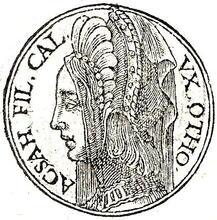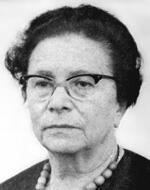Ahinoam: Bible
Ahinoam is a Hebrew Bible character appearing in the Book of Samuel as King David’s wife and mother of his eldest son, Amnom. In the five contexts in which she is mentioned, her name is only once referenced after Abigail, King David’s other wife. Since Ahinoam’s name usually precedes Abigail’s name, it is suggested that David married Ahinoam before he married Abigail, or that the name order signifies Ahinoam’s status as the mother of David’s firstborn son. It is additionally possible that Ahinoam had been Saul’s wife before David married her.
Article
Ahinoam, said to come from Jezreel, is King David’s wife and the mother of his eldest son, Amnon. All references to her occur with, or in close literary proximity to, Abigail (another wife of David, king of Israel, c. 1005–965 B.C.E.).
Following Abigail’s marriage to David (1 Sam 25:42), David “also” marries Ahinoam from Jezreel (v. 43). Ahinoam and Abigail are with David during his stay with King Achish of Gath (1 Sam 27:3), are taken captive when Amalekites raid Ziklag, David’s Philistine base (1 Sam 30:5), and are among those who go with David to Hebron when he becomes king over Judah (2 Sam 2:2). The last reference to Ahinoam occurs in the list of David’s sons born at Hebron (2 Sam 3:2–5; 1 Chr 3:1–4), where she is noted in the first (Abigail is in the second) of six mother-son references. Of the five contexts in which Ahinoam appears, only in her marriage notice (1 Sam 25:43) does she come after Abigail. Since Ahinoam’s name usually precedes that of Abigail, it has been suggested that David married Ahinoam before he married Abigail (contrary to 1 Sam 25:42–43; see Levenson and Halpern). However, if Ahinoam’s son Amnon was David’s firstborn son (as both lists of sons affirm), then the order of their names might indicate Ahinoam’s status as the crown prince’s mother.
Only one other character named Ahinoam appears in the Hebrew Bible (Saul’s wife; see 1 Sam 14:50). Because she is roughly a contemporary of David’s wife, it is possible that “Ahinoam of Jezreel” is Saul’s wife Ahinoam. Citing YHWH’s words (via the prophet Nathan) to David, “I gave you … your master’s wives” (2 Sam 12:8), Levenson and Halpern argue that David’s marriage to Ahinoam constituted a claim to Saul’s throne (see Absalom’s actions in 2 Sam 16:22). Perhaps David, like other kings who appropriated the harems of their predecessors or rivals, strengthened his claim to the throne in this way.
Levenson, John D., and Baruch Halpern. “The Political Import of David’s Marriages.” Journal of Biblical Literature 99 (1980): 507–18.
Meyers, Carol, ed. Women in Scripture: A Dictionary of Named and Unnamed Women in the Bible, the Apocryphal/Deuterocanonical Books, and the New Testament. New York: Houghton Mifflin 2000.









